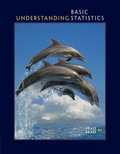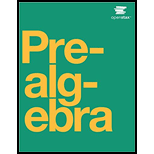
EBK UNDERSTANDING BASIC STATISTICS
8th Edition
ISBN: 8220106798706
Author: BRASE
Publisher: Cengage Learning US
expand_more
expand_more
format_list_bulleted
Concept explainers
Textbook Question
Chapter 1, Problem 1CR
Terminology If a numerical measure describes an aspect of a sample, is it a statistic or a parameter?
Expert Solution & Answer
To determine
Whether the statement is a statistic or parameter.
Answer to Problem 1CR
Solution: A numerical measure describing an aspect of a sample is a statistic.
Explanation of Solution
A sample statistic is a numerical measure that describes an aspect of a sample and a population parameter is a numerical measure that describes an aspect of a population. Parameter is drawn from the measurements of the units of population and on the other hand, the statistic is drawn from the measurements of the elements of the sample.
Want to see more full solutions like this?
Subscribe now to access step-by-step solutions to millions of textbook problems written by subject matter experts!
Students have asked these similar questions
Business
https://www.hawkeslearning.com/Statistics/dbs2/datasets.html
NC Current Students - North Ce X | NC Canvas Login Links - North ( X
Final Exam Comprehensive x Cengage Learning
x
WASTAT - Final Exam - STAT
→
C
webassign.net/web/Student/Assignment-Responses/submit?dep=36055360&tags=autosave#question3659890_9
Part (b)
Draw a scatter plot of the ordered pairs.
N
Life
Expectancy
Life
Expectancy
80
70
600
50
40
30
20
10
Year of
1950
1970 1990
2010 Birth
O
Life
Expectancy
Part (c)
800
70
60
50
40
30
20
10
1950
1970 1990
W
ALT
林
$
#
4
R
J7
Year of
2010 Birth
F6
4+
80
70
60
50
40
30
20
10
Year of
1950 1970 1990
2010 Birth
Life
Expectancy
Ox
800
70
60
50
40
30
20
10
Year of
1950 1970 1990 2010 Birth
hp
P.B.
KA
&
7
80
% 5
H
A
B
F10
711
N
M
K
744
PRT SC
ALT
CTRL
Chapter 1 Solutions
EBK UNDERSTANDING BASIC STATISTICS
Ch. 1.1 - Statistical Literacy In a statistical study, what...Ch. 1.1 - Statistical Literacy Are data at the nominal level...Ch. 1.1 - Statistical Literacy What is the difference...Ch. 1.1 - Statistical Literacy For a set population, does a...Ch. 1.1 - Critical Thinking Numbers are often assigned to...Ch. 1.1 - Interpretation Lucy conducted a survey asking some...Ch. 1.1 - Marketing: Fast Food A national survey asked 1261...Ch. 1.1 - Advertising: Auto Mileage What is the average...Ch. 1.1 - Ecology: Wetlands Government agencies carefully...Ch. 1.1 - Archaeology: Ireland The archaeological site of...
Ch. 1.1 - Student Life: Levels of Measurement Categorize...Ch. 1.1 - Business: Levels of Measurement Categorize these...Ch. 1.1 - Fishing: Levels of Measurement Categorize these...Ch. 1.1 - Education: Teacher Evaluation If you were going to...Ch. 1.1 - Critical Thinking You are interested in the...Ch. 1.2 - Statistical Literacy Explain the difference...Ch. 1.2 - Statistical Literacy Explain the difference...Ch. 1.2 - Statistical Literacy Marcie conducted a study of...Ch. 1.2 - Statistical Literacy A random sample of students...Ch. 1.2 - Interpretation In a random sample of 50 students...Ch. 1.2 - Interpretation A campus performance series...Ch. 1.2 - Critical Thinking Greg took a random sample of...Ch. 1.2 - Critical Thinking Consider the students in your...Ch. 1.2 - Critical Thinking Suppose you are assigned the...Ch. 1.2 - Critical Thinking In each of the following...Ch. 1.2 - Sampling: Random Use a random-number table to...Ch. 1.2 - Sampling: Random Use a random-number table to...Ch. 1.2 - Sampling: Random Use a random-number table to...Ch. 1.2 - Prob. 14PCh. 1.2 - Computer Simulation: Roll of a Die A die is a cube...Ch. 1.2 - Prob. 16PCh. 1.2 - Education: Test Construction Professor Gill is...Ch. 1.2 - Education: Test Construction Professor Gill uses...Ch. 1.2 - Sampling Methods: Benefits Package An important...Ch. 1.2 - Sampling Methods: Health Care Modern Managed...Ch. 1.3 - Statistical Literacy A study of college graduates...Ch. 1.3 - Statistical Literacy Consider a completely...Ch. 1.3 - Critical Thinking A brief survey regarding...Ch. 1.3 - Critical Thinking A randomized block design was...Ch. 1.3 - Interpretation Zane is examining two studies...Ch. 1.3 - Interpretation Suppose you are looking at the 2006...Ch. 1.3 - Ecology: Gathering Data Which technique for...Ch. 1.3 - General: Gathering Data Which technique for...Ch. 1.3 - General: Completely Randomized Experiment How...Ch. 1.3 - Survey: Manipulation The NewYork Times did a...Ch. 1.3 - Critical Thinking An agricultural study is...Ch. 1 - Terminology If a numerical measure describes an...Ch. 1 - Terminology If a variable describes an individual...Ch. 1 - Prob. 3CRCh. 1 - Terminology If it makes sense to say that one data...Ch. 1 - Terminology Consider a sample of size n. If every...Ch. 1 - Terminology If a treatment is applied to subjects...Ch. 1 - Critical Thinking Sudoku is a puzzle consisting of...Ch. 1 - Critical Thinking Alisha wants to Jo a statistical...Ch. 1 - Statistical Literacy You are conducting a study of...Ch. 1 - Radio Talk Show: Sample Bias A radio talk show...Ch. 1 - Prob. 11CRCh. 1 - General: Type of Sampling Categorize the type of...Ch. 1 - General: Gathering Data Which technique fur...Ch. 1 - General: Experiment How would you use a completely...Ch. 1 - Student Life: Data Collection Project Make a...Ch. 1 - Form Problem: Fireflies Suppose you air conducting...Ch. 1 - Use a random-number table or random-number...Ch. 1 - Use a random-number table or random-number...Ch. 1 - What does it mean to say that we are going to use...Ch. 1 - In your own words, explain the differences among...Ch. 1 - Simulate the results of tossing a fair die 18...Ch. 1 - Prob. 2UTA
Knowledge Booster
Learn more about
Need a deep-dive on the concept behind this application? Look no further. Learn more about this topic, statistics and related others by exploring similar questions and additional content below.Similar questions
- Harvard University California Institute of Technology Massachusetts Institute of Technology Stanford University Princeton University University of Cambridge University of Oxford University of California, Berkeley Imperial College London Yale University University of California, Los Angeles University of Chicago Johns Hopkins University Cornell University ETH Zurich University of Michigan University of Toronto Columbia University University of Pennsylvania Carnegie Mellon University University of Hong Kong University College London University of Washington Duke University Northwestern University University of Tokyo Georgia Institute of Technology Pohang University of Science and Technology University of California, Santa Barbara University of British Columbia University of North Carolina at Chapel Hill University of California, San Diego University of Illinois at Urbana-Champaign National University of Singapore McGill…arrow_forwardName Harvard University California Institute of Technology Massachusetts Institute of Technology Stanford University Princeton University University of Cambridge University of Oxford University of California, Berkeley Imperial College London Yale University University of California, Los Angeles University of Chicago Johns Hopkins University Cornell University ETH Zurich University of Michigan University of Toronto Columbia University University of Pennsylvania Carnegie Mellon University University of Hong Kong University College London University of Washington Duke University Northwestern University University of Tokyo Georgia Institute of Technology Pohang University of Science and Technology University of California, Santa Barbara University of British Columbia University of North Carolina at Chapel Hill University of California, San Diego University of Illinois at Urbana-Champaign National University of Singapore…arrow_forwardA company found that the daily sales revenue of its flagship product follows a normal distribution with a mean of $4500 and a standard deviation of $450. The company defines a "high-sales day" that is, any day with sales exceeding $4800. please provide a step by step on how to get the answers in excel Q: What percentage of days can the company expect to have "high-sales days" or sales greater than $4800? Q: What is the sales revenue threshold for the bottom 10% of days? (please note that 10% refers to the probability/area under bell curve towards the lower tail of bell curve) Provide answers in the yellow cellsarrow_forward
- Find the critical value for a left-tailed test using the F distribution with a 0.025, degrees of freedom in the numerator=12, and degrees of freedom in the denominator = 50. A portion of the table of critical values of the F-distribution is provided. Click the icon to view the partial table of critical values of the F-distribution. What is the critical value? (Round to two decimal places as needed.)arrow_forwardA retail store manager claims that the average daily sales of the store are $1,500. You aim to test whether the actual average daily sales differ significantly from this claimed value. You can provide your answer by inserting a text box and the answer must include: Null hypothesis, Alternative hypothesis, Show answer (output table/summary table), and Conclusion based on the P value. Showing the calculation is a must. If calculation is missing,so please provide a step by step on the answers Numerical answers in the yellow cellsarrow_forwardShow all workarrow_forward
arrow_back_ios
SEE MORE QUESTIONS
arrow_forward_ios
Recommended textbooks for you
 Glencoe Algebra 1, Student Edition, 9780079039897...AlgebraISBN:9780079039897Author:CarterPublisher:McGraw Hill
Glencoe Algebra 1, Student Edition, 9780079039897...AlgebraISBN:9780079039897Author:CarterPublisher:McGraw Hill Holt Mcdougal Larson Pre-algebra: Student Edition...AlgebraISBN:9780547587776Author:HOLT MCDOUGALPublisher:HOLT MCDOUGAL
Holt Mcdougal Larson Pre-algebra: Student Edition...AlgebraISBN:9780547587776Author:HOLT MCDOUGALPublisher:HOLT MCDOUGAL Big Ideas Math A Bridge To Success Algebra 1: Stu...AlgebraISBN:9781680331141Author:HOUGHTON MIFFLIN HARCOURTPublisher:Houghton Mifflin Harcourt
Big Ideas Math A Bridge To Success Algebra 1: Stu...AlgebraISBN:9781680331141Author:HOUGHTON MIFFLIN HARCOURTPublisher:Houghton Mifflin Harcourt

Glencoe Algebra 1, Student Edition, 9780079039897...
Algebra
ISBN:9780079039897
Author:Carter
Publisher:McGraw Hill

Holt Mcdougal Larson Pre-algebra: Student Edition...
Algebra
ISBN:9780547587776
Author:HOLT MCDOUGAL
Publisher:HOLT MCDOUGAL

Big Ideas Math A Bridge To Success Algebra 1: Stu...
Algebra
ISBN:9781680331141
Author:HOUGHTON MIFFLIN HARCOURT
Publisher:Houghton Mifflin Harcourt

Sampling Methods and Bias with Surveys: Crash Course Statistics #10; Author: CrashCourse;https://www.youtube.com/watch?v=Rf-fIpB4D50;License: Standard YouTube License, CC-BY
Statistics: Sampling Methods; Author: Mathispower4u;https://www.youtube.com/watch?v=s6ApdTvgvOs;License: Standard YouTube License, CC-BY